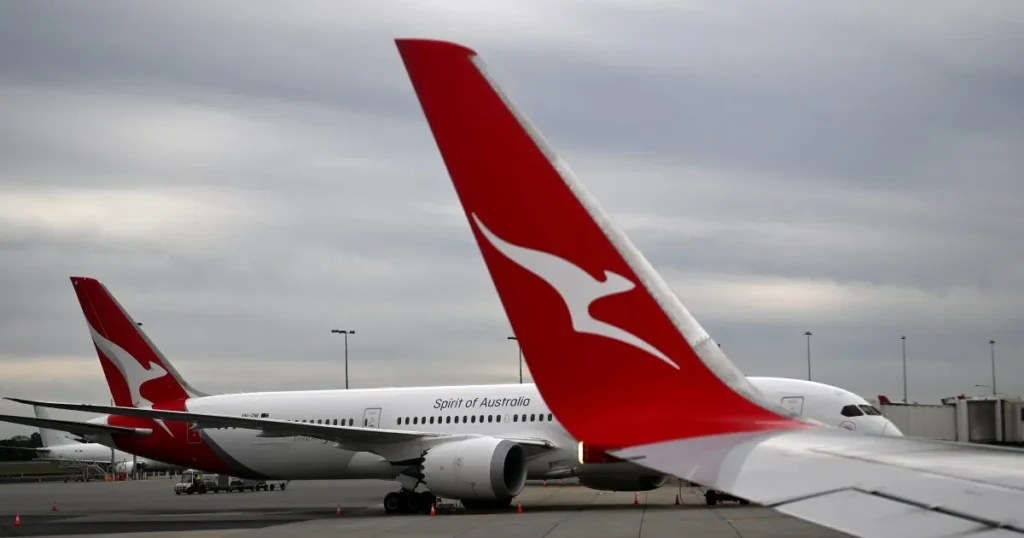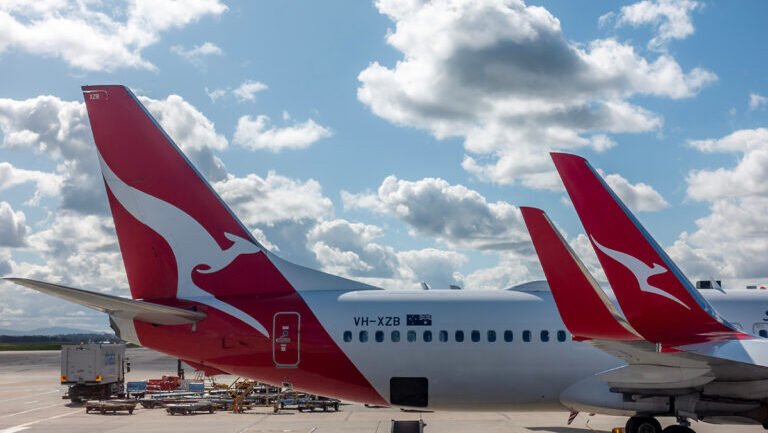In a shocking turn of events, Australia’s flagship carrier Qantas has confirmed that cyberattackers claiming to hold data on nearly 6 million customers have made direct contact with the airline. The Qantas cyberattack, which has quickly become one of the biggest data breaches in Australian aviation history, has left millions worried about their personal data and raised serious questions about cybersecurity practices in major corporations.
This article will explore the timeline of the breach, what data may have been stolen, how Qantas is responding, and what it means for customers. We will also look at the broader context of rising cyberattacks globally and what lessons can be learned from this serious incident.
The timeline of the Qantas cyberattack
The Qantas cyberattack story first emerged last week when unusual activity was detected in the airline’s IT systems. Initial statements suggested that no customer data had been accessed. However, within days, a group of hackers claimed they had successfully stolen personal information belonging to millions of Qantas Frequent Flyer program members and other customers.

Qantas officially confirmed the breach on Monday, stating that attackers had made contact with them and demanded a ransom to avoid the data being leaked or sold on the dark web.
The airline explained that while its core flight systems and safety operations were not compromised, the attackers managed to breach customer databases, potentially affecting up to 6 million individuals.

What data was stolen in the Qantas cyberattack?
While Qantas is still investigating the full scope of the breach, initial reports suggest that the following types of data may have been accessed:
- Full names
- Dates of birth
- Email addresses
- Frequent flyer membership numbers
- Travel history and booking details
- Phone numbers
- Partial payment card information (but not full card numbers or CVVs)
Qantas has assured customers that critical financial data, such as complete credit card numbers and passwords, are encrypted and have not been directly accessed. However, the combination of travel details and personal information is still enough to put customers at risk of identity theft and phishing attacks.
How did the hackers get in?
The exact methods used by the hackers in the Qantas cyberattack are not yet fully disclosed, but cybersecurity experts believe the attack involved exploiting vulnerabilities in third-party service providers connected to Qantas’s network.
This is a growing trend in cyberattacks worldwide. Attackers often find weaker links in supply chains, using them as entry points to larger, better-protected organizations. Once inside, they can move laterally across networks to extract sensitive data.
Qantas is now working with Australian cybersecurity authorities, including the Australian Cyber Security Centre (ACSC), to investigate the breach and identify the attackers.
How is Qantas responding to the cyberattack?
Qantas has taken immediate steps to contain the breach. Here’s what they are doing:
- Securing systems: The airline has temporarily shut down certain customer-facing systems and reset internal security protocols.
- Notifying affected customers: Qantas has started informing customers whose data may have been exposed. They are providing guidance on how to protect themselves from scams and phishing.
- Monitoring for suspicious activity: The airline has set up enhanced monitoring of accounts and suspicious activities linked to the stolen data.
- Working with authorities: Qantas is cooperating fully with law enforcement and cybersecurity agencies to track down the attackers and prevent data misuse.
In a statement, Qantas CEO Vanessa Hudson said, “We deeply regret this incident and apologise to all our loyal customers. We are working tirelessly to secure our systems and support those affected.”
What should Qantas customers do now?
If you are a Qantas customer, you may be wondering what steps to take. Here are some practical tips:
- Check your email carefully: Be cautious of any emails claiming to be from Qantas. Hackers often use stolen data to launch convincing phishing scams.
- Monitor your accounts: Keep an eye on your bank and credit card statements for suspicious transactions.
- Update passwords: While Qantas reports no passwords were stolen, it is always a good idea to change your passwords regularly, especially if you reuse them across multiple services.
- Enable two-factor authentication (2FA): If you haven’t already, enable 2FA on your email and important accounts to add an extra layer of security.
- Be wary of calls and texts: Scammers might use your phone number to trick you into giving more personal information. Always verify the caller’s identity before sharing anything.
The broader impact of the Qantas cyberattack
The Qantas cyberattack is not an isolated event. Around the world, major companies are increasingly falling victim to sophisticated cyberattacks. In recent years, we’ve seen similar breaches at Optus, Medibank, and even global giants like Marriott and British Airways.
The aviation industry, in particular, is an attractive target for cybercriminals. Airlines hold large volumes of personal and financial data, as well as sensitive travel itineraries that can be valuable for espionage or identity theft.
Cybersecurity experts warn that these attacks are likely to increase in frequency and sophistication. The move toward digital services and interconnected supply chains means that even the most robust companies can have weak points that attackers exploit.
How do cyberattacks affect customer trust?
For airlines, trust is essential. Customers trust them with their lives when they fly, and with their data when they book flights and join loyalty programs. Incidents like the Qantas cyberattack can severely damage this trust.
After the news broke, social media was flooded with angry and worried comments from customers. Many expressed frustration at how such a large and reputed company could allow such a breach to happen. Others threatened to switch airlines or close their frequent flyer accounts.

Rebuilding trust will require more than just technical fixes. Transparent communication, visible security improvements, and proactive customer support are crucial in restoring confidence.
Qantas’s past security record
Qantas has long been known for its exceptional safety record in aviation. However, this incident highlights that cybersecurity is an equally critical part of modern safety standards.
Before this attack, Qantas had not experienced a publicly known major data breach. It had invested heavily in digital transformation, including a major overhaul of its booking systems and loyalty program. But even these efforts were not enough to stop determined attackers.
This breach underscores the reality that no system is completely secure. Even companies with high investments in cybersecurity can fall victim if any part of their network or supply chain has vulnerabilities.
Cybersecurity: A shared responsibility
The Qantas cyberattack is a reminder that cybersecurity is not just an IT issue—it is a business and community issue. Protecting data is a shared responsibility between companies and customers. Here’s what each party can do:
What companies should do:
- Invest in continuous security audits and penetration testing.
- Ensure that third-party vendors comply with strict security standards.
- Educate employees about phishing and social engineering attacks.
- Have a clear incident response plan in place.
- Be transparent and prompt in communicating breaches.
What customers should do:
- Use strong, unique passwords for different services.
- Regularly update passwords and enable two-factor authentication.
- Be cautious with links and attachments in emails.
- Review privacy settings on accounts.
- Stay informed about new scams and security alerts.
Could this happen again?
Unfortunately, experts believe that more cyberattacks are inevitable. As long as data holds value, criminals will continue to find new ways to steal it.
The key question is not just whether such attacks can be stopped, but how quickly they can be detected and contained. Companies need to shift from a mindset of “if” to “when” and prepare accordingly.
For Qantas, this means learning from the breach, strengthening defenses, and rebuilding customer trust. It also means sharing lessons learned with the broader business community to help others avoid similar fates.
The role of governments and regulators

Incidents like the Qantas cyberattack also highlight the need for stronger regulations and government support. Australia has already seen several high-profile data breaches in recent years, prompting new laws and discussions around cybersecurity standards.
In 2022, the Australian government introduced tougher penalties for companies that fail to protect customer data. Regulators now have more power to investigate breaches and fine organizations that do not take adequate precautions.
Governments also play a role in international cooperation, as cyberattacks often cross borders. Tracking down attackers requires collaboration with law enforcement and cybersecurity experts worldwide.
Lessons for businesses worldwide
The Qantas cyberattack serves as a wake-up call for all businesses, especially those holding large volumes of personal data. Some key lessons include:
- No company is immune, regardless of its size or reputation.
- Cybersecurity is an ongoing process, not a one-time project.
- Supply chain security is as critical as internal security.
- Quick, honest communication is crucial during a crisis.
- Investing in prevention is far cheaper than dealing with the aftermath of a breach.
Final thoughts
The Qantas cyberattack has put the personal information of 6 million customers at risk and created a significant challenge for one of Australia’s most iconic brands. While the airline works to recover, customers and businesses alike should take this as a serious reminder of the importance of cybersecurity in our connected world.
For affected customers, the priority now is to stay alert and take proactive steps to protect themselves from potential scams. For Qantas, the focus will be on regaining trust and proving that they can safeguard not only the skies but also the digital lives of their passengers.
In the coming weeks and months, we will likely learn more details about how the attack was carried out and who was behind it. Meanwhile, this incident should serve as a call to action for all of us—to rethink how we protect data, both as individuals and as organizations.
Follow us on Instagram: UAE STORIES
Read More: Emirates Premium Economy Kolkata-Dubai: A New Era of Comfort and Luxury












